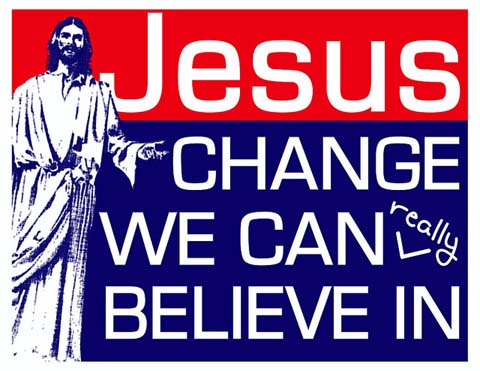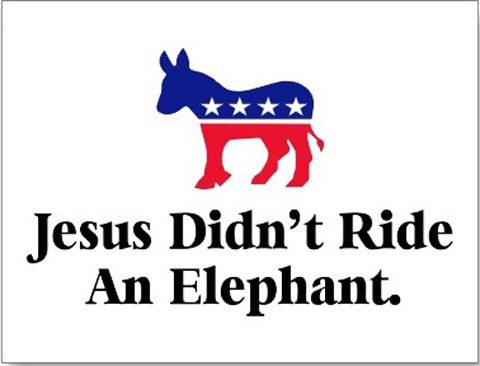There’s a bit of debate about Jesus’ politics these days.
“Jesus would send all these right-wing pseudo-Christians straight to hell,” writes Jack Clark.
“I can prove Jesus was a Republican,” writes Darrin Yaeger.
Jesus changed everything, notes author John Ortberg in his new book Who Is This Man? "He is history's most familiar figure. His impact on the world is immense and not a coincidence. And yet, Jesus did not brashly defend His movement in the spirit of a rising political leader."
So, why have His followers become so politicized?
 “Some of my church brothers and sisters were appalled when I showed up at home group sporting my Obama tee-shirt and parked my ‘Obama-mobile’ front-and-center in the parking lot (pretty much assuring that I’ll never be an elder . . .),” writes columnist Jeff Myers on behalf of a friend identified only as Bruce. “It’s almost as though they question the legitimacy of my faith because I don’t support the Republican viewpoint.”
“Some of my church brothers and sisters were appalled when I showed up at home group sporting my Obama tee-shirt and parked my ‘Obama-mobile’ front-and-center in the parking lot (pretty much assuring that I’ll never be an elder . . .),” writes columnist Jeff Myers on behalf of a friend identified only as Bruce. “It’s almost as though they question the legitimacy of my faith because I don’t support the Republican viewpoint.”
“To be sure, Jesus might commend Democrats for their concern for the poor, the downtrodden, the disenfranchised, the outcasts — the very people He reached out to again and again during His life on this earth,” writes an unsigned editorialist for the Modesto Bee newspaper in California. “To be sure, Jesus might commend Republicans for their focus on personal accountability and responsibility – the very things He espoused over and over again during His ministry. To listen to many of the politicians and partisans on both the left and the right these days, He’s one of their own. They show up at His churches, they talk of His principles and they ask His blessing on their policies and programs.”
So who’s right?
 “The secular left has mastered use of the Internet to further its extremist goals. In fact, President Obama’s web-based ‘Organizing for America’ propaganda machine may have given him the 2008 election,” writes Matt Barber. “I agree with Barack Obama that November 2012 represents the most important election of our lifetimes – perhaps our history. Of course, that’s where my agreement with Obama both begins and abruptly ends.
“The secular left has mastered use of the Internet to further its extremist goals. In fact, President Obama’s web-based ‘Organizing for America’ propaganda machine may have given him the 2008 election,” writes Matt Barber. “I agree with Barack Obama that November 2012 represents the most important election of our lifetimes – perhaps our history. Of course, that’s where my agreement with Obama both begins and abruptly ends.
“Here’s the operable question,” continues Berber. “Do we want America ‘fundamentally transformed’ to mirror the secular-socialist ideals of the radical leftist currently ‘occupying’ the White House? In Barack Obama’s America, individual freedom is trampled beneath jackboots as a matter of course. It’s already happening at an unprecedented rate. One need only look to the HHS mandate forcing Christian groups – both Catholic and Protestant – to violate, under penalty of law, biblical prohibitions against abortion homicide. Or consider recent attempts by multiple elected officials, all Democrats, to shutdown Chick-fil-A – a private, Christian-owned business – simply because its leadership holds the biblical view of marriage. Is this
George Washington’s America, or Joseph Stalin’s Russia?”
There seems to be very little middle ground.
 “Many of us feel that our faith has been stolen, and it’s time to take it back,” writes Jim Wallis, editor of Sojourners magazine. “An enormous public misrepresentation of Christianity has taken place. Many people around the world now think Christian faith stands for political commitments that are almost the opposite of its true meaning. How did the faith of Jesus come to be known as pro-rich, pro-war, and pro-American? And how do we get back to a historic, biblical, and genuinely evangelical faith rescued from its contemporary distortions?
“Many of us feel that our faith has been stolen, and it’s time to take it back,” writes Jim Wallis, editor of Sojourners magazine. “An enormous public misrepresentation of Christianity has taken place. Many people around the world now think Christian faith stands for political commitments that are almost the opposite of its true meaning. How did the faith of Jesus come to be known as pro-rich, pro-war, and pro-American? And how do we get back to a historic, biblical, and genuinely evangelical faith rescued from its contemporary distortions?
“That rescue operation is even more crucial today, in the face of a social crisis that cries out for prophetic religion,” continues Wallis. “The problem is clear in the political arena, where strident voices claim to represent Christians, when they clearly don’t speak for most of us. We hear politicians who love to say how religious they are but utterly fail to apply the values of faith to their public leadership and political policies. It’s time to take back our faith in the public square, especially in a time when a more authentic social witness is desperately needed. When we do, we discover that faith challenges the powers that be to do justice for the poor, instead of preaching a ‘prosperity gospel’ and supporting politicians that further enrich the wealthy. We remember that faith hates violence and tries to reduce it, and exerts a fundamental presumption against war, instead of justifying it in God’s name. We see that faith creates community from racial, class, and gender divisions and prefers international community over nationalist religion, and we see that ‘God bless America’ is found nowhere in the Bible. And we are reminded that faith regards matters such as the sacredness of life and family bonds as so important that they should never be used as ideological symbols or mere political pawns in partisan warfare.”
 So, who is right? Well, what did Jesus Himself say?
So, who is right? Well, what did Jesus Himself say?
Where would He stand regarding, for example, war — specifically the conflicts in Iraq and Afghanistan or our support for Israel? Jesus said: “Blessed are the peacemakers: for they shall be called the children of God” (Matthew 5:9). Its meaning is obvious for anti-war Christians – Jesus was against all war.
However, He was also against evil – so, the same verse is very effectively quoted in America’s intervention against the Nazis as they undertook to exterminate every non-blond “Aryan” in Europe. Today does it also apply to the Taliban in Afghanistan burning schools for girls and growing opium in support of jihad? What about Saddam Hussein in Iraq? Muamar Khadafi’s Libya? Syria? Egypt? Pakistan? Nigeria?
But say the anti-war Christians, what about “Resist not evil: but whosoever shall smite thee on thy right cheek, turn to him the other also” (Matthew 5:39) and “I say unto you, Love your enemies, bless them that curse you, do good to them that hate you, and pray for them which despitefully use you, and persecute you” (Matthew 5:44)? Obviously Jesus was anti-war, right?
 Well, respond the Christian crusaders, what about Matthew 11:12 “Heaven suffers violence, and the violent take it by force.” Or Matthew 10:34-39: “Do not suppose that I have come to bring peace to the earth. I did not come to bring peace, but a sword. For I have come to turn ‘a man against his father, a daughter against her mother, a daughter-in-law against her mother-in-law’ – a man’s enemies will be the members of his own household. Anyone who loves his father or mother more than me is not worthy of me; anyone who loves his son or daughter more than me is not worthy of me; and anyone who does not take his cross and follow me is not worthy of me. Whoever finds his life will lose it, and whoever loses his life for my sake will find it.”
Well, respond the Christian crusaders, what about Matthew 11:12 “Heaven suffers violence, and the violent take it by force.” Or Matthew 10:34-39: “Do not suppose that I have come to bring peace to the earth. I did not come to bring peace, but a sword. For I have come to turn ‘a man against his father, a daughter against her mother, a daughter-in-law against her mother-in-law’ – a man’s enemies will be the members of his own household. Anyone who loves his father or mother more than me is not worthy of me; anyone who loves his son or daughter more than me is not worthy of me; and anyone who does not take his cross and follow me is not worthy of me. Whoever finds his life will lose it, and whoever loses his life for my sake will find it.”
And such it is when one dissects the Bible on such issues as the death penalty, administration of justice, materialism, separation of church and state, and feeding the poor. In Luke 14:13-14, Jesus said, “But when you give a feast, invite the poor, the maimed, the lame, the blind, and you will be blessed, because they cannot repay you. You will be repaid at the resurrection of the just.”
However in Mark 14:7, He discounted their plight: “The poor you will have with you always.”
 Maybe a better case can be made from Christ’s own politics. After teaching in the countryside for three years, He returned to Jerusalem where He received a Triumphal Entry – with the entire city lining the streets, placing coats in front of his donkey, waving palm branches and shouting “Hosanna! Blessed is He who comes in the name of the Lord!” They were convinced He was there to throw out the occupying Romans, restore the Kingdom of David and reign over them in Jewish majesty.
Maybe a better case can be made from Christ’s own politics. After teaching in the countryside for three years, He returned to Jerusalem where He received a Triumphal Entry – with the entire city lining the streets, placing coats in front of his donkey, waving palm branches and shouting “Hosanna! Blessed is He who comes in the name of the Lord!” They were convinced He was there to throw out the occupying Romans, restore the Kingdom of David and reign over them in Jewish majesty.
Instead, He explained that your and my brief time here on Earth is just a test. His real concern was that we accept His gift of grace and spend all eternity with Him in the presence of our loving, Almighty Father, who puts up with our perplexing human contradictions and continuous squabbles because He loves us.
The people of Jerusalem were infuriated by such a message. Within the week, they were shouting “Crucify Him, crucify Him” and the baffled Roman governor, Pontius Pilate, did just that – washing his hand of the whole matter and telling his fearful wife that he couldn’t figure out what these people wanted.
And so it is today. “It is clear that we American Christian Democrats are in a jam,” writes an unsigned blogger on the website Jesus Is a Liberal.
The same could be said of the American Christian Republicans.
And Libertarians.
And Independents.
"Jesus' life is not an abstract subject to be debated by experts," writes Ortberg. "It is an invitation. Do you know what Jesus said about anything? Try living accordingly. Take a stab at removing contempt from your life, and see how life runs. See how well you are able to do it. Try living as if there is a heavenly Father who cares for and listens to you. Try living 'without worry' one day at a time."
“Every few days we hear about a judge ruling that a certain Christian symbol in a school is unconstitutional, or we hear that the recitation of the pledge of allegiance is offensive because it has ‘God’ in its text,” muses third-year history major Kenneth Capps in Stanford University’s Review newspaper. “Does this sound like Jesus? No, He died because He stood up to a culture that rejected Him. Christians have a duty to follow Jesus.
“Christians should absolutely form their political stances based on their beliefs, just as secular people base theirs off their beliefs. But they should be wary of associating too much with the beliefs of popular culture and be ready to bring the change that society needs, through Christ our Lord.”

